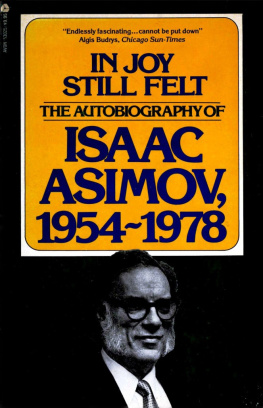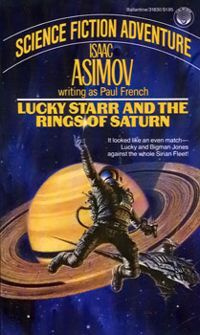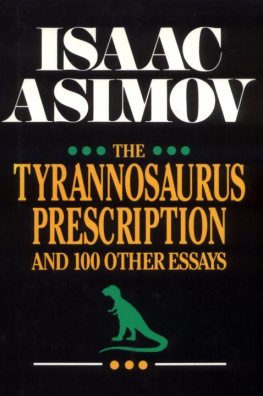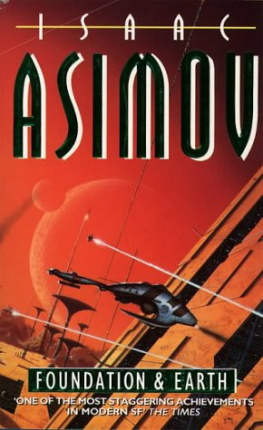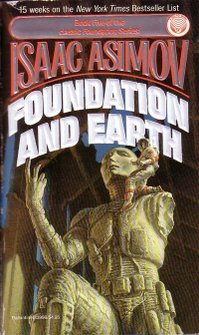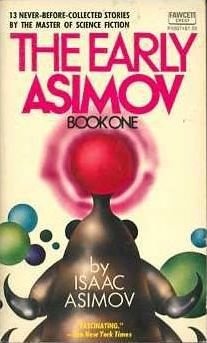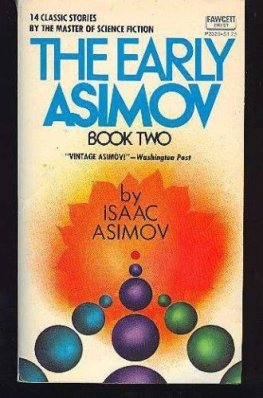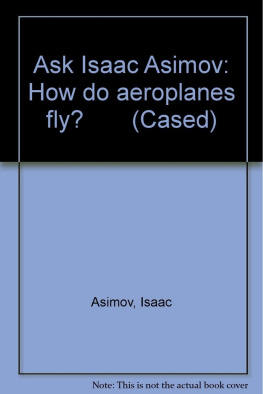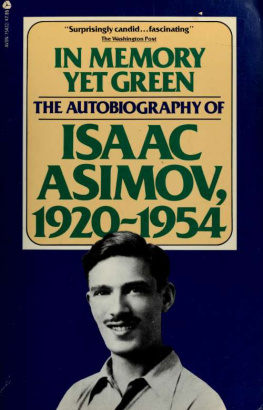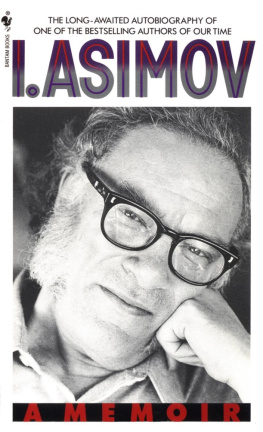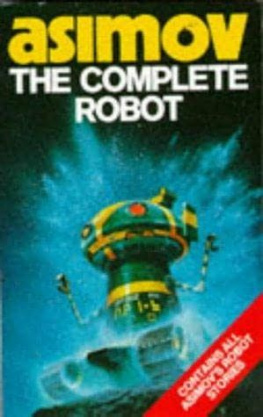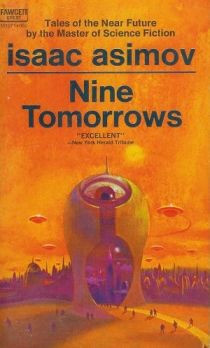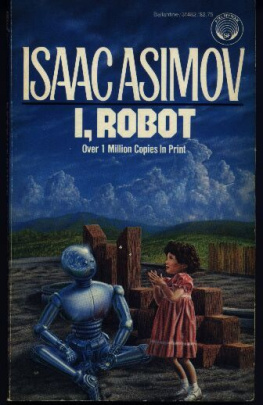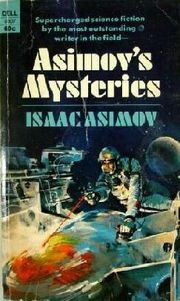Isaac Asimov - The Early Asimov. Volume 3
Here you can read online Isaac Asimov - The Early Asimov. Volume 3 full text of the book (entire story) in english for free. Download pdf and epub, get meaning, cover and reviews about this ebook. year: 1976, publisher: Graphton, genre: Science fiction. Description of the work, (preface) as well as reviews are available. Best literature library LitArk.com created for fans of good reading and offers a wide selection of genres:
Romance novel
Science fiction
Adventure
Detective
Science
History
Home and family
Prose
Art
Politics
Computer
Non-fiction
Religion
Business
Children
Humor
Choose a favorite category and find really read worthwhile books. Enjoy immersion in the world of imagination, feel the emotions of the characters or learn something new for yourself, make an fascinating discovery.

- Book:The Early Asimov. Volume 3
- Author:
- Publisher:Graphton
- Genre:
- Year:1976
- ISBN:058-603937-6
- Rating:5 / 5
- Favourites:Add to favourites
- Your mark:
- 100
- 1
- 2
- 3
- 4
- 5
The Early Asimov. Volume 3: summary, description and annotation
We offer to read an annotation, description, summary or preface (depends on what the author of the book "The Early Asimov. Volume 3" wrote himself). If you haven't found the necessary information about the book — write in the comments, we will try to find it.
The Early Asimov. Volume 3 — read online for free the complete book (whole text) full work
Below is the text of the book, divided by pages. System saving the place of the last page read, allows you to conveniently read the book "The Early Asimov. Volume 3" online for free, without having to search again every time where you left off. Put a bookmark, and you can go to the page where you finished reading at any time.
Font size:
Interval:
Bookmark:
Isaac Asimov
The Early Asimov. Volume 3
To the memory of
John Wood Campbell, Jr. (1910-1971) for reasons that this book will make amply obvious
Introduction
After 'Time Pussy'[1]there followed a two-month period during which I wrote nothing.
The reasons were twofold. In the first place, Pearl Harbor put the United States in the war the day I wrote Time Pussy,' and those first two months after the debacle were too disastrous and heartbreaking to allow much in the way of fiction composing.
If that in itself weren't enough, the time had come to try, once again, the qualifying examinations that would, or would not, grant me permission to do research. I very much felt myself to be dangling over the abyss. A second failure to pass would probably mean an end for me at Columbia. Consequently, during those hours when I wasn't working in my father's candy store or hanging over the radio, I had to be studying. There was time for nothing else at all.
Hedging my bets rather desperately, I registered for graduate work at New York University, just in case I did not pass once again. After I took my qualifying examinations, at the end of January 1942, I actually attended a few classes at N.Y.U. while waiting for the results to be announced. - But I won't keep you in suspense. On Friday, the thirteenth of February, the results were announced. I had passed, this time.
During the interval between the taking of the qualifying examinations and the annunciation, I managed to do 'Victory Unintentional.' This was a positronic robot story that was a sequel to 'Not Final!' which had not been a positronic robot story. Obviously I was trying to ride the series notion all I could, in the hope of surer sales.
I submitted it to Campbell on February 9, 1942, and if I thought Campbell would find himself unable to reject a series story, I was roundly disabused. Nor was he so impressed by 'Nightfall' and by my 'Foundation' series as to find himself incapable of making the rejection a severe one.
On February 13, the very day of my passing into the sacred list of those permitted to do research toward their Ph.D., my spirits were somewhat dashed when I received 'Victory Unintentional' back with a cryptic rejection, which consisted of the following, in toto, 'CHSC2CH2CH2SH.' Campbell very well knew that this was the formula for 'butyl' mercaptan,' which gives the skunk its smell, and I very well knew it, too, and Campbell very well knew I knew.
Oh, well! I managed to sell it anyway, to Super Science Stories under its post-Pohl editor, on March 16, 1942, and it appeared in the August 1942 issue of that magazine. Though I did not include it in I, Robot, I did include it, of necessity, in The Rest of the Robots.
After that, though, there came another dry period, the longest I was ever to experience. Once 'Victory Unintentional' was finished, fourteen months (!) were to pass before I turned back to the typewriter. It was not the conventional 'writer's block,' of course, for that I have never experienced. Rather, it was the coming of a vast, triple change in my life.
The first change was the fact that I was now beginning chemical research in earnest under Professor Charles R. Daw-son. Research is a full-time job and I still had to work it around, somehow, my duties in my father's candy store,.so there was bound to be very little time for writing.
Then, as though that weren't enough, a second change took place simultaneously -
In January 1942 I joined an organization called 'The Brooklyn Writers' Club,' which had sent me a postcard of invitation. I took the invitation to be a recognition of my status as a 'writer' and I couldn't possibly have refused.
The first meeting I attended was on January 19, 1942. It turned out to be rather pleasant. I welcomed the chance to get my mind off the qualifying examinations and the war disasters (though I remember spending part of that first meeting discussing the possibility that New York might be bombed).
Most of the members of the club were no further advanced in the profession than I was; nor were any of them, aside from myself, science fiction writers. The chief activity consisted of reading from our own manuscripts so that criticism from the others might be invited. Since it was quickly discovered that I read 'with expression,' I became chief reader, a role I enjoyed. (It was to be eight years yet before I discovered that I had a natural flair for the lecture platform.)
On February 9, 1942, the third meeting I attended, there was present a young man, Joseph Goldberger, whom I had not met before. He was a couple of years older than I was. I did most of the reading that day and Goldberger was sufficiently impressed to suggest, after the meeting had adjourned, that the two of us, with our girls, go out on a double date and get to know each other. Embarrassed, I had to explain that I had no girl. With an expansive gesture, he said he would get one for me.
And so he did. On February 14, 1942, (Valentine's Day and the day after I had passed my qualifying examinations) I met him at the Astor Hotel at 8.30 p.m. With him was his girlfriend, and with her was her girl-friend, Gertrude Blugerman, who was going to be my blind date. -I fell in love, and when I wasn't thinking of research I was thinking of her.
But there was also a third change, in a way the most drastic-
With war, the job situation suddenly changed: technically trained men of all sorts were in demand.
Robert Heinlein, for instance, was an engineer who had been trained at Annapolis. His health had retired him from active service in the Navy and had kept him retired, but his Annapolis connections made it possible for him to work as a civilian engineer at the Naval Air Experimental Station of the U.S. Navy Yard in Philadelphia. He cast about for other qualified people he might persuade to join him there, particularly among his fellow science fiction writers.
He got L. Sprague de Camp to come to the N.A.E.S., and on March 30, 1942, I received a letter from the navy yard asking if I would consider joining them.
I am rather single-minded and, having labored toward my Ph.D. for a year and a half, I would not ordinarily have considered letting go for anything short of a major force. - But the major force was there. I was in love and I wanted to get married even more than I wanted my degree. It occurred to me that I could suspend work toward my Ph.D. with the full approval of the school, thanks to the war emergency, and that I could also get full permission to resume after the war. And by taking a job and postponing - merely postponing - my research, I could get married.
I went down to Philadelphia for an interview on April 10 and apparently met their requirements. I took the iob, and on May 14, having left my father's candy store at last and (at least as a worker) forever, I moved to Philadelphia. Fortunately, Philadelphia was only an hour and a half from New York by train (in those days, I couldn't drive a car and, even if I could, I wouldn't have been able to get the gasoline because of rationing). I was therefore back in New York every weekend.
By the twenty-fourth of the month I had persuaded Gertrude to agree to marry me, and on July 26 we were married.
During those months it did not bother me that I was doing no writing. I had too much to think of - first the war, then research, then the job, then the marriage.
Besides, in the years up to early 1942, I never thought of my writing as anything but a way to help out with my college tuition. It was fun; it was exciting; and such success as I managed to achieve was deeply satisfying - but it had been done to serve a purpose and that purpose had been served. I had no notion that writing could be my career; that it could ever possibly be my career.
Font size:
Interval:
Bookmark:
Similar books «The Early Asimov. Volume 3»
Look at similar books to The Early Asimov. Volume 3. We have selected literature similar in name and meaning in the hope of providing readers with more options to find new, interesting, not yet read works.
Discussion, reviews of the book The Early Asimov. Volume 3 and just readers' own opinions. Leave your comments, write what you think about the work, its meaning or the main characters. Specify what exactly you liked and what you didn't like, and why you think so.

